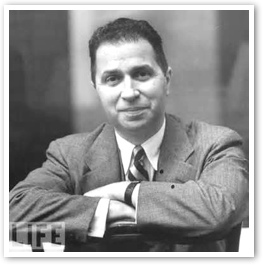Adler on Education
- MORTIMER J. ADLER
Individuals whose schooling was specialized rather than liberal and who do not continue learning when they leave schooling behind, or do so only to improve their specialized expertise, never become generally educated human beings. This statement holds for most physicians, lawyers, and engineers, as well as for most who getting a Ph.D. merely indicated the field of specialization they would cultivate thereafter.
 |
Mortimer J. Adler
|
Education? The word is used so loosely that to talk about "education" without qualifying adjectives attached to it is not informative; or worse, it is misleading.
The qualifying adjectives I suggest are "general" and "special," "preparatory" and "continuing," "terminal" and "unending." Most people think of education as something that goes on in educational institutions, schools, colleges, and universities. They regard persons who have earned a diploma, a certificate, or a degree as individuals who, to some extent, have been educated.
They forget that individuals learn a great deal with little or no schooling. They forget that experience teaches, and that learning by any means is part of a lifelong educational process. Schools of all grades and kinds are only one group of means in the pursuit of education.
A much better question to ask is: Who is a generally educated human being? The negative answer is easy; certainly not any person who has just earned a diploma: a degree, or some other sort of certification.
Youth itself is the greatest obstacle to becoming a generally educated human being. Schooling at its best is preparatory. In addition, it is often specialized, preparing individuals for some forms of skilled work or for professional expertise. Finally, it is terminal: it can be completed in a relatively few years.
When the school is liberal, when it trains individuals in the liberal arts that are the arts of learning, it is preparatory. Those who are liberally trained to read and write, speak and listen, measure and calculate, have acquired the skills to go on learning after they have graduated, but unless they continue to learn year after year, they are likely never to become generally educated human beings. If the liberal training they receive in school includes a taste of all the major disciplines they will have some awareness of what there is to learn in order to become generally educated by the end of their lives.
Becoming a generally educated person is a lifelong process. It is an unending pursuit of learning, concluded by death but never finished or terminated by death. In my judgement, sixty is the age at which one can begin to become generally educated, on condition, of course, that the process has been continuing after all schooling has been finished.
After age sixty, one is fully mature and experienced, has been challenged by all the intricate problems of living, has done a great deal of conversing, and is finally ready to make and defend solutions to life's major problems, or to acknowledge the existence of problems to which one can find no satisfactory solutions.
Individuals whose schooling was specialized rather than liberal and who do not continue learning when they leave schooling behind, or do so only to improve their specialized expertise, never become generally educated human beings. This statement holds for most physicians, lawyers, and engineers, as well as for most who getting a Ph.D. merely indicated the field of specialization they would cultivate thereafter.
 This is Meaghen Gonzalez, Editor of CERC. I hope you appreciated this piece. We curate these articles especially for believers like you.
This is Meaghen Gonzalez, Editor of CERC. I hope you appreciated this piece. We curate these articles especially for believers like you.
Please show your appreciation by making a $3 donation. CERC is entirely reader supported.

Acknowledgement
Adler, Mortimer J. "Adler on the Term `Education'." The Radical Academy archives. (1999).
The Author
Mortimer J. Adler (1902-2001) was chairman and cofounder with Max Weismann of the Center for the Study of The Great Ideas and Editor in Chief of its journal Philosophy is Everybody's Business. He was, in addition, the founder and Director of the Institute for Philosophical Research, Chairman of the Board of Editors of Encyclopaedia Britannica, Editor in Chief of the Great Books of the Western World and The Syntopicon: An Index to the Great Ideas, Editor of The Great Ideas Today (all published by Encyclopaedia Britannica), Co-Founder and Honorary Trustee of The Aspen Institute, past Instructor at Columbia University, and Professor Emeritus at the University of Chicago (1930-52).
Ongoing programs started or developed by Dr. Adler include: The Great Books Foundation (with Robert Hutchins), the Basic Program of Liberal Education for Adults at the University of Chicago (with Robert Hutchins), the Executive Seminars of The Aspen Institute, the Paideia Project (a plan for major reform of public school education), and The Great Ideas seminars at the Center for the Study of The Great Ideas — all promoting liberal education through an understanding of great works of philosophy, literature, history, science, and religion. He was the author of over 50 books, including Adler's Philosophical Dictionary: 125 Key Terms for the Philosopher's Lexicon, How to Read a Book, How to Speak/How to Listen, How to Think About The Great Ideas, and Aristotle for Everybody.
Copyright © 1999 Mortimer Adler



